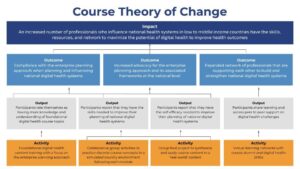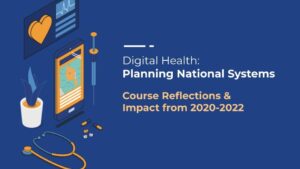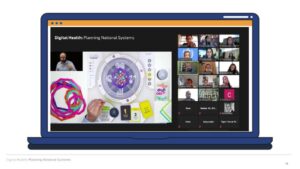
The course, Digital Health: Planning National Systems, is designed to empower ministry leadership with the foundational and technical concepts and planning tools necessary to steer and orient national digital health stakeholders towards an enterprise planning approach. The course has been packaged in different ways to appeal to different learner preferences (self-paced, instructor-led, or a combination of all of the above), but all with the same content that can be taken individually or with a broader cohort. The course across all languages include nine core modules (though the English version has one more on digital financial services), a variety of interactive case study activities, knowledge checks, and instructional videos and animations to guide the learners through key concepts. Each module’s learning content is about 1.5 hours, and the cohort-based, facilitated versions of the course include another 1.5 hours of group activities per module.
The curriculum has been developed by USAID, Digital Square, and TechChange and is based on content compiled by the World Health Organization (WHO) and the International Telecommunications Union (ITU). All content is creative commons licensed meaning that TechChange acts as a steward of the content and are not the owners. Learners and trainers can share and adapt the material for any purpose, even commercially, as long as the license terms are adhered to.
This course is currently available in English, French and Spanish, and Portuguese. It has also since been translated into Mongolian by a team at Mongolian society of Artificial Intelligence in Medicine on their own platform.
The course is best suited for leaders and managers from health, ICT, and finance ministries who work in Digital Health (eHealth, mHealth, HIS, CHIS, etc) in low and middle income countries. It would also be applicable for in-country stakeholders who work with these ministries such as donors, multi-laterals and UN agencies, and large implementing NGOs to ensure conceptual and planning alignment.
The course is designed to empower ministry leadership with the technical concepts and planning tools necessary to steer and orient national digital health stakeholders towards an enterprise planning approach. The curriculum features critical technical concepts, existing best practices, and pragmatic methods, all framed according to the national planning cycle that Ministry of Health officials manage.
English, French, Spanish, Portuguese
Content
Creative Commons (CC BY-NC-SA 4.0) license
B5 | B5 Learning and training systems
As of December 2023, the facilitated versions of the course have a total of 696 graduates (with a completion rate of ~66%) across 93 countries, who have applied their knowledge in their work in-country, and most have leveraged it to contribute to their digital health strategies, training others in their teams, and supporting digital health intervention design and investment.
We have compiled 4 case studies that describe these examples in more detail – one in Lao, another in Uganda, another in Bangladesh, and another in Montenegro. See the Resources section below for links.
The content includes information on health standards i.e. semantic and syntactic standards which are discussed in the context of designing systems to be interoperable.
Architects of Digital Health board game at GDHFThe content includes information on interoperability standards: across all modules, the concept of interoperability is discussed, and specifically, a health information exchange is described in detail in Module 4.
Not Applicable
All maturity model assessments are self-reported by the funded organization leading the content development of the global good.
https://drive.google.com/drive/folders/1M_BVhfyAre16m4ikQzVFt78DVsyjTvTP
Videos: Global Goods Playlisthttps://www.youtube.com/playlist?list=PLlTZ64izC0jxKgwBSCTdXOIzzyuDDM_je
Video: Standards and Interoperability in Digital Health: ExplainedThe course Alumni Network's Community of Practice for global graduates from the Digital Health: Planning National Systems (DHPNS) course is just beginning to be established. The mission is to provide a space where course alumni can connect and support one another by exchanging knowledge, lessons learned, and experiences related to applying digital health course concepts in their work planning national digital health systems to promote better health outcomes. There are currently 696 members of the DHNPS Alumni Network. They are globally distributed with the vast majority coming from LMICs in the Global South.
The goals of the global Alumni Network's Community of Practice are to:
1) Connect with and support fellow DHPNS course alumni network to apply course learnings and achieve their desired outcomes and impact.
2) Share and exchange knowledge on the application of digital health concepts, contextualized adaptations, identified 'best practices,' and lessons learned.
3) Expand on DHPNS course learnings by updating resources and advising on emerging digital health trends and technologies.
This course also has partnerships to continue to support the development, design, maintenance and updating of the course and its alumni network, including the WHO, UNICEF, DICE, DSQ, and USAID. A governance body to help manage these partnerships, priorities, and funding resources is also in development.
The content has been developed by USAID, Digital Square, and TechChange and is based on content compiled by the World Health Organization (WHO) and the International Telecommunications Union (ITU). The WHO has taken an active role in reviewing and approving any new content as it gets added to the courses on the TechChange platform. The content has been supported primarily through funding from USAID , UNICEF/DICE and The Global Fund funding via Digital Square since 2017. A Total Cost of Ownership model is available.


